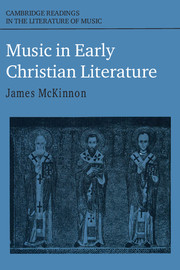Book contents
- Frontmatter
- Contents
- Preface
- Introduction
- 1 The New Testament
- 2 The Christian literature of the first and second centuries
- 3 The Greek authors of the third century
- 4 Western authors of the third and early fourth centuries: Carthage and Rome
- 5 Fourth-century Alexandria and desert monasticism
- 6 Fourth-century Asia Minor: the Cappadocians
- 7 Palestine, Antioch and Syria
- 8 The Greek historians
- 9 The Apostolic Constitutions, Egeria, and the eastern councils
- 10 Western authors of the fourth and early fifth centuries
- 11 Augustine and minor western authors
- Epilogue
- Bibliography
- Index of musical and liturgical terms and concepts
4 - Western authors of the third and early fourth centuries: Carthage and Rome
Published online by Cambridge University Press: 05 June 2012
- Frontmatter
- Contents
- Preface
- Introduction
- 1 The New Testament
- 2 The Christian literature of the first and second centuries
- 3 The Greek authors of the third century
- 4 Western authors of the third and early fourth centuries: Carthage and Rome
- 5 Fourth-century Alexandria and desert monasticism
- 6 Fourth-century Asia Minor: the Cappadocians
- 7 Palestine, Antioch and Syria
- 8 The Greek historians
- 9 The Apostolic Constitutions, Egeria, and the eastern councils
- 10 Western authors of the fourth and early fifth centuries
- 11 Augustine and minor western authors
- Epilogue
- Bibliography
- Index of musical and liturgical terms and concepts
Summary
The western authors of the period lack the Hellenizing tendency of their Alexandrian contemporaries. In their remarks about music this is reflected in the relative absence of musical imagery and the near total absence of reference to music as a liberal art. What they share with their eastern counterparts is an awakening mistrust of pagan instrumental music. Arnobius in particular, associates the playing of musical instruments with sexual immorality, in language of shocking vehemence. But the most important contribution of the third century western authors is in the positive realm of liturgical song. Two of the three extant pre-Nicene descriptions of the synaxis are from Tertullian; the most important contribution to the pre-history of vespers before Egeria is from the Apostolic Tradition of Hippolytus; and Cyprian favors us with a passage of singular warmth and sensibility on psalmody at Christian meals.
Tertullian (c.170–c.225)
A native and life-long resident of Carthage, he was the most powerful and original Christian author writing in Latin before Augustine, Prior to his conversion he was thoroughly schooled in literature and rhetoric. His work is brilliant and complex, more inclined to deal with questions of ethics and religious discipline than speculative theology. Above all it is intensely polemic. In his later years he embraced the rigoristic heresy of Montanism. With respect to music there are several important references to psalmody and hymnody scattered throughout his writings, and he was an early exemplar of the polemic against musical instruments.
- Type
- Chapter
- Information
- Music in Early Christian Literature , pp. 42 - 50Publisher: Cambridge University PressPrint publication year: 1987



